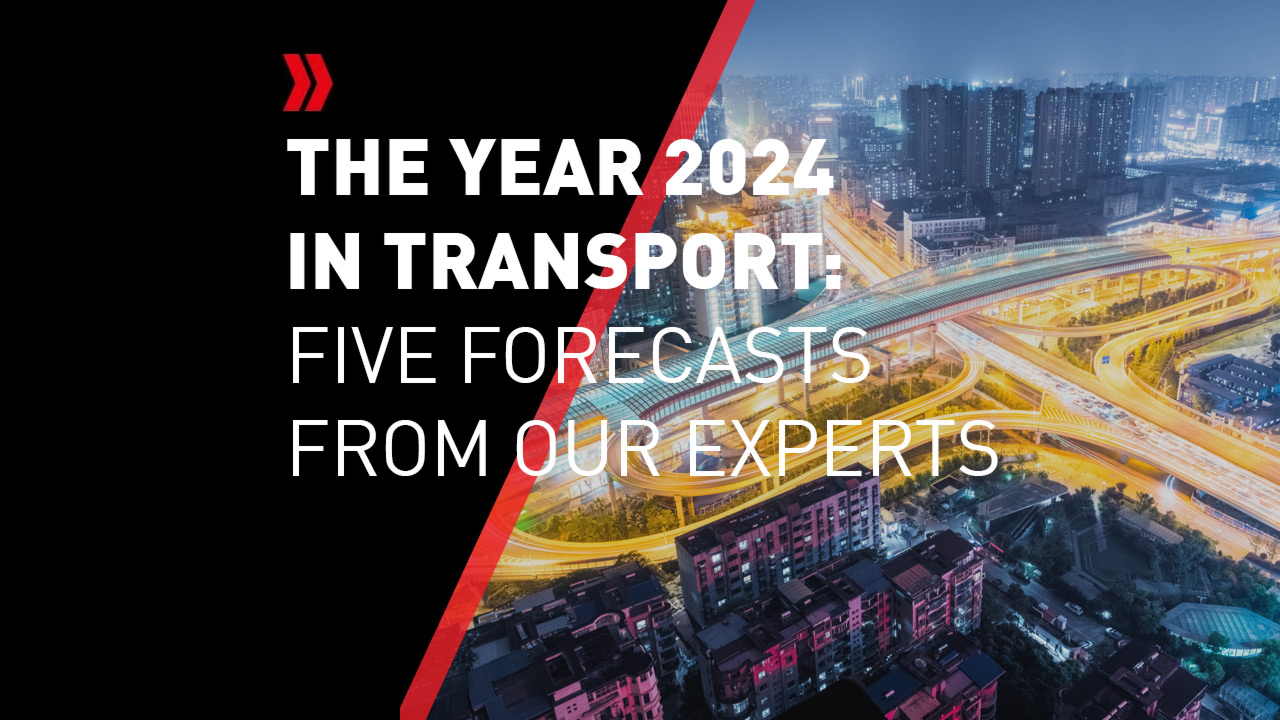What will the year 2024 bring for transportation? Here are five forecasts from our experts.
Aleksandra Hanusik
Published 29.11.2023
6 min reading time

The war in Ukraine, the Israeli-Palestinian conflict, the Taiwan crisis, high inflation, and an unstable geopolitical situation – these are the major challenges that accompanied us in the past year. Will they affect the transportation industry in 2024? What can we expect in the next 12 months? How will technological transformation impact our reality?
We asked five experts from Visline, representing various perspectives on the future of the TSL (Transport, Shipping, and Logistics) market, to answer these questions.
Łukasz Przytarski – 3,5 T Loads Department, Visline

“Stabilization in the transportation market and specialization as the future for carriers.”
Next year, we can be certain of a deepening of current trends. One of the most conspicuous will be carriers’ specialization in operating within a certain market or route. Companies conducting transport in a chosen region are well-versed in local regulations, and their fleet is tailored to these guidelines. They also have experience in customs clearances, where know-how developed through years of executing orders is a deciding factor for the efficient completion of services within the set timeframe.
On the winning side will be companies that meet certain conditions: owning their fleet, experience in customs clearances on a given route, and the number of specializations. Customers often mention this, highly valuing the support and advice of the transport company in terms of customs clearance for the contracted freight. This is especially important for significant European routes, such as the United Kingdom, Scandinavia, or the Iberian Peninsula.
I hope that the coming year will be a time of stabilization. After an economic slowdown, a rebound will occur rapidly, which will lead to increased demand for transport services. A game-changer would be the end of the war in Ukraine.
Adam Jeziorek – Transport Department, Visline

“Fleet adjustment – key in the context of short and long-term regulatory changes.”
Predicting, I bet on the dynamic development of intermodal transport as a consequence of EU climate policy and the overall revival of the economy, which will translate into a larger number of orders.
Certainly, transport companies will have a lot of work as they consider changes and improvements to their fleets. For example? London. From October 2024, the entry of heavy goods vehicles into the capital of Great Britain will be subject to additional restrictions. Carriers will need to adapt their vehicles to the Direct Vision Standard (DVS) at a three-star level, thereby further increasing pedestrian safety in the vicinity of heavy goods vehicles.
Looking further ahead, there are also changes concerning equipping vehicles of 3.5 tons gross vehicle weight (GVW) with tachographs. True, new regulations are still almost three years away from coming into effect, but a significant portion of carriers will start preparations for the impending changes next year.
Konrad Spuła – AI Department, Visline

“Artificial Intelligence – yes, but with small steps. It’s a good time for experiments.”
Technological transformation, and in particular the development of artificial intelligence, will certainly not bypass the TSL industry. For the moment, however, it is difficult to speak of concrete solutions on a large scale. There are two factors behind this. First, the dynamics of the development of this technology outpace implementation capabilities. This means that a solution that now seems ideal for our business may be displaced by another technology in just a few months, which does not make economic sense for projects that take a year or more to implement. I see greater chances in smaller projects, tests, prototyping.
Second – legislation. In my opinion, the coming months will be a breakthrough, as we are a step away from the enactment of a law regulating the use of artificial intelligence in the European Union. The adoption of the so-called “AI ACT” will stabilize the situation related to this technology by providing a set of guidelines that will direct the development and use of AI in Europe for the next 10-20 years. The “AI ACT” will decide on issues such as copyrights to AI-created works, databases, or prompts, and will define the boundaries of responsibility for the outcomes of artificial intelligence among users, software owners, distributors, and possibly even the machines themselves.
The potential of AI is unlimited, but we are still far from the everyday sight of autonomous cars on the streets, or fully robotized order handling. I would expect that we will first experience the wider use of AI in route planning, customer service, and internal document flow.
Paweł Tomaszewski – 7,5 T Loads Department, Visline

“An upturn in the industry is coming, and intermodal transport will gain in importance.”
In 2024, I would bank on a greater interest in intermodal transport. The European Union will deepen its policy aimed at reducing the carbon footprint. Definitely, specific solutions will be part of this, and some of them are already in place.
According to the Directive of the European Parliament from February 24, 2022, by March 2024, member states are obliged to introduce road tolls, the amount of which will depend on the level of CO2 emissions. Germany has already decided on such a step – from December 1, 2023, the rate card for trucks meeting the Euro 6 standard increased by over 80%. Following Berlin, Austria announced an increase in road tolls. Due to price hikes, intermodal transport will be an opportunity to find savings – on the other hand, it will extend delivery times and will not cover a large part of the market, such as express shipments or dedicated transports.
I think that the next year will also bring some revival to the TSL market. While the first and second quarters will still be marked by uncertainty, assuming nothing surprising happens in the world, falling inflation, stabilization of fuel prices, and hardening after the shock caused by the outbreak of war in Ukraine will bring a clear increase in demand for transport services.
Tomasz Kempa – FTL/LTL Loads Department, Visline

“We’ve already passed the inflationary breathlessness. New technologies will rise in importance.”
The litmus test for changes is sales performance. Considering the latest reports, there are clear indications that the shortness of breath caused by high inflation in the eurozone is starting to pass. I predict that we will experience a noticeable rebound by mid-year. In the first two quarters of the next year, we might observe price pressure imposed on carriers enforcing low freight rates, but an increase in demand around May and June will break this negative trend, and transport companies will recover.
In the media space, there is a lot of talk about artificial intelligence. Even in 2024, I wouldn’t expect any significant breakthrough in the context of applications in the Transport, Shipping, and Logistics (TSL) industry, but one should definitely keep a close watch on the development of this technology, especially solutions from overseas, where a lot of attention is given to autonomous vehicles. For now, what we need is legislation in this area, which is still in the shaping stages.
In 2024, I do not foresee a gigantic breakthrough in the widespread use of alternative drives in heavy transport. I believe that this is the future. It is essential to monitor this trend and jump on this train as quickly as the prospect of utility becomes viable, in order to become a pioneer in the market.



